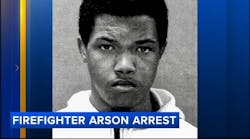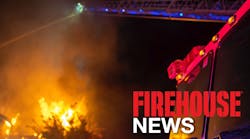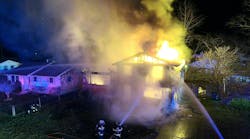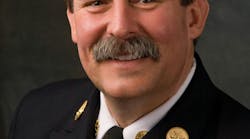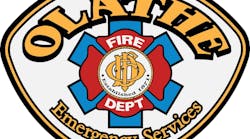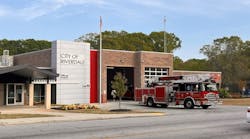There are those today who believe there have always been degree programs with a fire service emphasis, but that is not the case. Many from my generation served in the forefront of bringing college education into the fire service. We followed the rough-hewn path of the forward-thinking people who went before us.
Two of my true heroes in this pursuit are no longer with us. The late Dr. Leonard Marks, who was the fire chief in Bremerton, WA, and the late Martin Grimes, who arrived at the National Fire Protection Association (NFPA) from Great Britain via the Bermuda fire service, are examples of people whose lives were dedicated to the improvement of education in the fire service. They devoted much time and effort to improving the standing of education within the fire service. In today's fire service, a college education has become an expected part of the resume of anyone who hopes to attain a leadership position within a fire department.
Let me share some thoughts about my perception of the importance of one critical aspect of higher education to the future of our fire service. Far too many among us consider the gathering of a voluminous number of facts the purpose of going to college. People like this do not get the greatest possible benefit from their journey through the groves of academe. You do not need to attend college to gather a vast reservoir of job-related facts. This can be done by acquiring and reading books. You can also gather a wide array of facts from the Internet. Unfortunately, the Internet does not teach you how to think. It just provides an almost endless source of things about which you should be thinking.
Thinking is an important aspect of the higher education world that is often overlooked. I am referring to the type of thinking that requires you to weigh and evaluate things. This type of thinking is called "critical thinking." We need to note that great value has been placed on the lessons of the "critical thinking" process that occurs within the world of higher education.
Problem solving and critical thinking lie at the heart of every aspect of life. How can a fire department plan and prepare for the future unless there are people charged with weighing and evaluating the varied range of alternatives that they may be called on to consider? There are those who use the term "thinking outside the box" when in reality they are referring to the concept of critical thinking. The identification and analysis of new approaches is truly the meat and potatoes of critical thinking. This requires the full range of skills that should be provided to students within the world of higher education.
It has been my experience that critical thinking can occur anytime a person works to judge, decide or solve a problem. In the higher education world we are all exposed to the thought that reading, writing, speaking and listening can all be done in two distinctly different ways. You can be critical of the works you are reading or you can simply accept things as facts just because you read them in a book or in a magazine article. This failure to challenge what is being presented exposes you to the charge of thinking uncritically. My professional associates and I believe critical thinking is crucial to becoming a reader who pays attention to the words in front of them and challenges the thoughts they are being asked to accept.
In What is Critical Thinking? (1906), William Graham Sumner stated, "critical thinking is a way of taking up the problems of life. Others have suggested the brain is a physical entity that must be nourished and exercised. It is suggested that only by the continual review and challenging of new sources of knowledge can we hope to develop our brain capacity and improve our thought processes.
Critical thinking is not a random practice. You must be able to use such tools as logic — the formal type or, as is frequently the case, a more informal style of thinking (informal, but organized). To do this properly, you must be trained to employ broad intellectual skills such as clarity, credibility, accuracy, precision, relevance, depth, breadth, significance and fairness. You must be able to analyze and evaluate information from a wide range of sources. Once this has been done, you should then be able to synthesize new approaches to the task at hand. A specific method for performing these functions is used within the higher education community. It is called "Bloom's Taxonomy" and was first presented in 1956 by Benjamin Bloom. Here they are in ascending order of application:
Knowledge
Comprehension
Application
Analysis
Synthesis
Evaluation
Quite simply, you begin by coming to know something. You then move on to the point where you understand the topic. The next step involves analyzing the information to gather a deeper understanding of it. Once you know it, you must be able to apply it to the world at large. You can then analyze its impact on your issues. At the upper level you must be able to synthesize (create) new uses for the knowledge you have mastered.
There are a number of tasks you and I must understand in order to apply them to our personal and professional lives. First and foremost, we must be able to recognize and identify problems. So much of what we do in life revolves around the identification and solving of problems that to ignore the development of these skills condemns us to a mediocre, second-class existence. We also must be able to challenge the norms in our lives and work to identify new and better ways of doing things when appropriate. The ability to think critically helps us to understand how to prioritize the tasks we must accomplish to solve a problem. To do this we must develop skills in research and data acquisition. Within the higher education setting, the gathering and analysis of information forms the basis of our efforts. We must look at what exists to determine what must be learned. If we are to think and write properly, we must know how to comprehend the current state of affairs to decide how to create new and unique combinations of information.
You must also develop an understanding of the relationships that exist between and among various schools of thinking and human endeavor. Once you have developed the necessary critical-thinking skills, you will be able to draw comparisons and make new assumptions that will help you solve unique problems. As you become involved in the process of developing new and distinct thoughts on how to solve your problems, you may even discover that 10 other people have developed 10 different ways of solving those problems.
At this point, you can broaden your experience by testing these unique solutions against your own. It should be possible for you to draw new conclusions and create new generalizations that can advance the overall level of knowledge within your field. In An Experiment in the Development of Critical Thinking (1941), Edward M. Glaser states that critical thinking involves "a persistent effort to examine any belief or supposed form of knowledge in the light of the evidence that supports it and the further conclusions to which it tends."
There are a number of ways in which you can improve your thinking. Become the person who raises important questions and problems. Be the person who stimulates the thought process by forming your inquiries clearly and precisely. In order to assist you in developing your skills, let me offer the following, which can be gained from a solid foundation within the higher education world. You will develop the ability to gather and assess relevant information. In your courses you will be taught to use abstract ideas and interpret them effectively for your associates.
If your education has developed properly, you will become that person in your group who comes to well-reasoned conclusions and solutions. You will also be well-trained in the testing of these against relevant criteria and standards. That will tie your new knowledge to your existing mental data base. People will come to recognize you as the person who possess the ability to think open-mindedly within alternative systems of thought, recognizing and assessing the available options as need be. You will be able to assist others by testing their assumptions, implications and practical consequences. Be a sounding board. Become known as the person off of whom people can bounce their ideas and receive honest feedback. After a trip through the world of higher education, you will hopefully be the person who communicates effectively with others in figuring out solutions to complex problems. You will know to ask questions.
Higher education involves more than earning credits and memorizing facts. It involves the growth you will experience during your interactions with other learners. Perhaps the best proof of this involves that form of "critical thinking" that involves you and your ability to be critical of your own efforts. None of us is perfect, so be willing to engage in debates about the validity of your own ideas.
HARRY R. CARTER, Ph.D., a Firehouse® contributing editor, is a municipal fire protection consultant based in Adelphia, NJ, and a veteran of 47 years in the fire and emergency services. He is chairman of the Board of Commissioners in Howell Township Fire District 2 and retired from the Newark, NJ, Fire Department in 1999 as a battalion commander. Dr. Carter has also been a member of the Adelphia Fire Company since 1971, serving as chief in 1991. He is a life member and past president of the International Society of Fire Service Instructors and a life member of the National Fire Protection Association. Dr. Carter holds six degrees, with his terminal degree being a Ph.D. in organization and management, with a specialization in leadership, from Capella University in Minneapolis, MN, where he is an adjunct faculty member.
